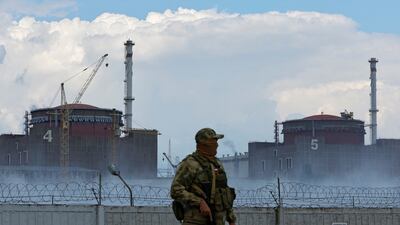The war in Ukraine is entering a new phase as Russian troops mass in the south in preparation for a Ukrainian counter-offensive, western analysts believe.
The new front line emerging near Zaporizhzia has led to renewed concern over the safety of the city's nuclear power plant after Russia and Ukraine accused each other of shelling the site.
Ukraine said Russia was on the defensive in the south and had carried out air strikes as it tried to hold captured territory, some of it seized in the early weeks of the war.
An intelligence update by Britain's Defence Ministry on Saturday said convoys of Russian tanks, lorries and weapons were being repositioned to the south from the eastern Donbas region.
There were also reports of equipment being moved from Russian-occupied Mariupol and from the Crimean peninsula, annexed in 2014, where battalion-sized units were being readied.
The battalions massing in Crimea "will highly likely be sent into the Kherson region in the coming days," the ministry said.
"Russia's war on Ukraine is about to enter a new phase, with the heaviest fighting shifting to roughly a 350km front line stretching southwest from near Zaporizhzhia to Kherson."
Ukraine is believed to be hitting bridges, ammunition depots and rail links to weaken Russia's ability to resupply its forces.
Russia said it had shot down three ballistic missiles near Kherson, the first major city it occupied after invading Ukraine in February.
The Russian occupiers in Kherson are thought to be planning a referendum on a potential annexation by Moscow, in an echo of the 2014 poll in Crimea that western powers dismissed as a sham.
Ukrainian President Volodymyr Zelenskyy said this week that his forces were "gradually moving forward" in Kherson and Kharkiv as they try to regain lost ground.
The Institute for the Study of War, a think tank in Washington, said in a daily assessment that Russia's reinforcement of Kherson came "at the expense of efforts to seize Sloviansk", a city in Donetsk "which they appear to have abandoned".
Russia first sought to capture the capital Kyiv, but was repelled in the early weeks of the war. It then refocused its offensive in Luhansk and Donetsk, capturing the first and making significant headway in the second.
Mr Zelenskyy said Russia had caused an "extremely risky situation for everyone in Europe" by firing at the Zaporizhzhia nuclear plant twice in one day.
It is the latest nuclear scare during the 163-day conflict. Russian troops had occupied the site of the 1986 Chernobyl nuclear disaster and the fighting threatened Zaporizhzhia's power supply.
Russia-Ukraine war - in pictures
"This is the largest nuclear power plant on our continent. And any shelling of this facility is an open, brazen crime, an act of terror," Mr Zelenskyy said.
A senior adviser to Mr Zelenskyy, Mykhailo Podolyak, said on Saturday that it was a miracle that the plant did not explode. He called for the UN to hand control of the plant to a special commission.
But Russia denied blame. The Defence Ministry in Moscow said it was the Ukrainian army that had launched three artillery strikes at the plant, Russian news agency Interfax reported.
Russia said it had captured 70 people suspected of helping the Ukrainian army and security services in the surrounding area.
Rafael Grossi, head of the International Atomic Energy Agency, said last week that the plant was “completely out of control” and that “every principle of nuclear safety has been violated.”














